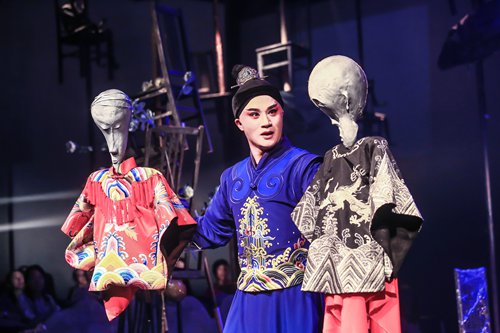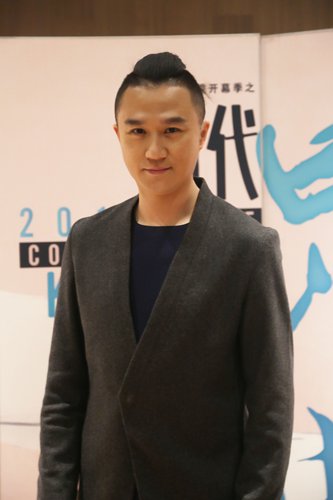Joy Zhang, an HR expert, became quite excited as she watched a new Kunqu Opera performance this past Friday. Titled I, Hamlet, Zhang told the Global Times that she never expected a traditional Chinese art form could so seamlessly integrate with a Shakespeare masterpiece.
"When a friend briefly introduced me this opera, I thought it might be a bit messy, as it is a one-man show of only about 75 minutes. But the performance was so great that even as a layman I was intoxicated," Zhang added.
Kunqu Opera was certified as a masterpiece of the Oral and Intangible Heritage of Humanity by UNESCO in 2001. Zhang Jun, known as China's "Kunqu prince," is using I, Hamlet as the debut performance for the grand opening of the New Shanghai Theater on Fuxing Road Middle.
The venue, which neighbors another city landmark, SAIC-Shanghai Culture Square, is using the five-day performance as part of Shanghai Contemporary Kunqu Week. Zhang, who plays the xiao sheng (young man) role in the 600-year-old opera, has acted in numerous leading roles of famous Kunqu plays such as The Peony Pavilion, The Palace of Eternal Youth and The Jade Hairpin.
New Shanghai Theater is the name of the old Shanghai Cinema, which was built 74 years ago. After reconstruction and renovation, the site now meets the requirements and standards of the modern performance art industry. The Global Times noticed that the ascending seating is more elevated than in most traditional venues, allowing audiences in the rear an equally generous view of the stage.

Stage photo of I, Hamlet. Photos: Courtesy of Zhang Jun and Ding Zhenjie
Sheng, dan, jing, chou
In this one-man contemporary performance, Zhang plays the roles of Hamlet, Ophelia, the ghost of his father and a tomb digger. The four roles represent the traditional Chinese opera roles sheng (male character), dan (female character), jing (painted role) and chou (clown) respectively.
For his 75-minute monologue, Zhang uses both English and the Kunshan dialect (where Kunqu originated) to match the different roles. English is just an ornamental trial. His recreation and innovation have jumped out of the original setting of the many styles of Hamlet.
But that doesn't prevent him from expressing the inner conflicts between love and revenge, darkness and brightness, life and death. His transition between the four roles doesn't cause any confusion to the audience, as Zhang is skilled in quickly changing his voice, clothes, hair, beard and cosmetics.
For audiences who know nothing about the background of Kunqu or Shakespeare's original tragedy, Zhang takes several minutes to narrate, offering clues and insight.
"This might be the ability of a real artist. His performance brings different feelings to both aficionados and laymen. I follow him in an enjoyable way while the aficionado finds something much deeper than me," first-time audience member Forest Fu told the Global Times.

Zhang Jun
An innovative combination
Both Zhang and Fu noticed that there are English subtitles for the whole opera. They told the Global Times that they would be proud to see traditional Chinese art performances being exported to foreign countries.
"To mingle with a very classic Western masterpieces would be a good way, as it's easier for foreigners to accept it as the first step. After they find it interesting, they naturally will be inclined to try something more authentically Chinese," Fu told the Global Times.
The cooperation of Shanghai Dramatic Arts Centre, New Shanghai Theater and Shanghai Zhangjun Kunqu Art Center brings vigor to the newly reborn New Shanghai Theater. The innovative combination of traditional and contemporary dramas marks a direction for the Shanghai Dramatic Arts Centre and New Shanghai Theater, the three organizers told media.
2016 marked the 400th anniversary of the passing of William Shakespeare and Tang Xianzu (a famous Chinese playwright whose best-known opera is The Peony Pavilion). Last year saw various events in Britain and China highlighting both Shakespeare and Tang. Zhang Jun's I, Hamlet is an extension of that theme.

